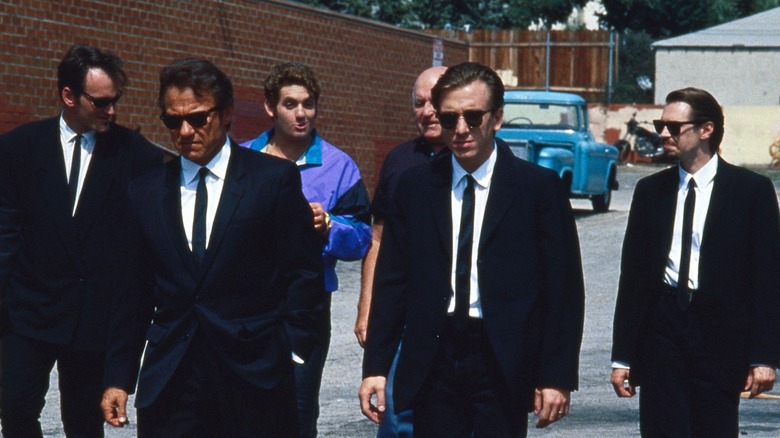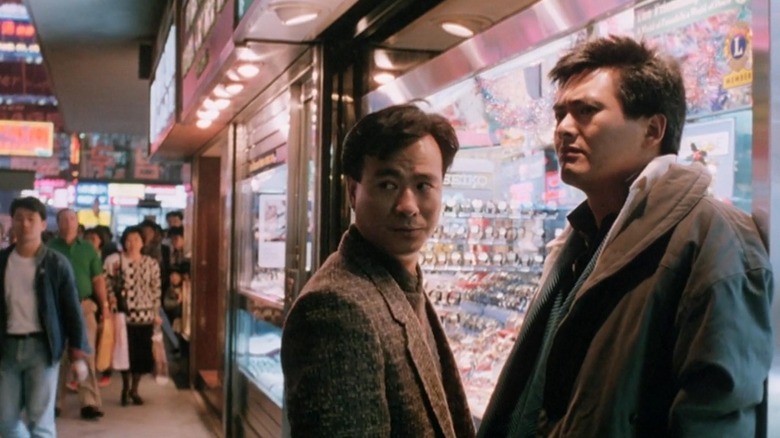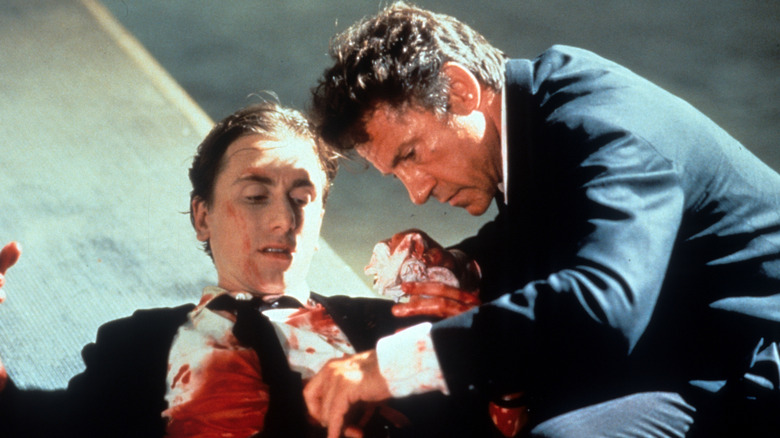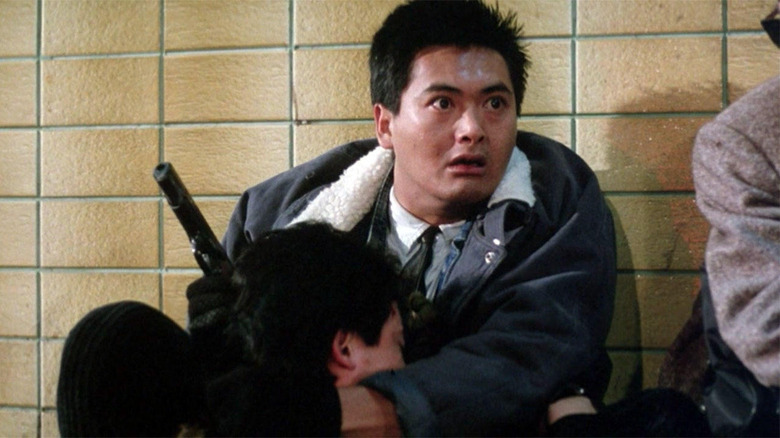The Under-Seen Classic That Inspired Quentin Tarantino's Reservoir Dogs
This post contains spoilers for "Reservoir Dogs" and "City on Fire" (1987)
Acclaimed actor/writer/director Quentin Tarantino is known for paying homage to classic films in his work, a signature move that he made even in his debut feature, the 1992 heist movie "Reservoir Dogs." The director's films frequently nod to foreign and obscure cinema, offering plenty of Easter eggs for the attentive viewer. A close watch of any of his films might feel like an unbroken string of cinematic references, but sometimes the influence of a single film is so strong that it permeates through the entire movie. Such is the case for "Reservoir Dogs," and the Hong Kong action movie "City on Fire."
The 1987 crime film by director Ringo Lam tells the story of Ko Chow, an undercover cop who is forced to take on another risky job when a fellow policeman is killed by a gang of thieves. Chow gets close with the gang — particularly to one member, Fu — and leads them into the police's trap by helping them organize a big jewelry heist. When one jumpy gang member shoots the jewelry store clerk for triggering the alarm, the troops come in guns blazing, shooting Chow in the stomach.
Once back at the warehouse hideout, the Boss and other gang members accuse Chow of being a rat, but Fu defends him, and there is a three-way stand-off. The cops arrive in a shower of bullets and Chow bleeds out on the floor. Before Fu is taken into custody, Chow reveals that he was a cop all along.
City on Fire, a 1987 Hong Kong crime film
"Reservoir Dogs" mirrors the final ten minutes of Lam's film and expands upon them, telling the tale of the heist backward. The inciting action takes place outside of the film, between the first and second scenes. This time, the audience doesn't know who the Judas is until it is revealed at the very end. The events of the heist are told in retrospect from the perspective of the hoodwinked criminals. Just like in "City on Fire," the rushed police response is triggered by the senseless shooting of the jewelry store clerk. It seems clear that they were surveilled given how quickly the cops responded, but there's no way to be sure until it's too late.
Since "City on Fire" follows the events leading up to the heist, the viewer has time to see Fu and Chow develop a friendship, all the while anticipating the pain that Chow's betrayal will inflict. In "Reservoir Dogs," the complex dynamic between Fu and Chow is mirrored in Mr. White and Mr. Orange. The cops shoot Mr. Orange in the stomach during the heist, just like they do to Chow, and Mr. White comforts his wounded partner, just like Fu does. The prospect of Mr. Orange's death, combined with Mr. White's code of honor, accelerates their intimacy and illustrates the depth of White's trust in Orange.
The final moments of "Reservoir Dogs" are almost identical to the final moments of "City on Fire," complete with the three-way stand-off. Both films end in a shootout, a confession, and the death of a rat, but in Tarantino's film, the stand-off ends when White takes a shot to the arm and shoots both his boss and his boss' son before the cops arrive. When Orange, who is still bleeding out, confesses that he is an undercover cop, White shoots him in front of the police.
What parts of City on Fire inspired Reservoir Dogs?
The similarities between "City on Fire" and "Reservoir Dogs" don't end with the plot. Tarantino makes some direct visual references to the Hong Kong film as well, like the iconic slow motion shot of the men walking away from the diner in the beginning of the film. This shot is very similar to one in "City on Fire," when Chow first meets the gang members mid-way through the movie. Then, of course, there is the three-way stand-off, which is shot similarly — but not identically — in both films.
There is even one more visual parallel that not every viewer would catch. During the heist in Lam's film, one of the gang members has a shootout with the police through a broken windshield. This moment is also closely mirrored in "Reservoir Dogs" in a flashback to Mr. Pink's escape from the crime scene.
"City on Fire" features a kind of stylized violence, with carefully framed and colorful shots of murder scenes. While "Reservoir Dogs" is a bit aesthetically grittier and has a more neutral color palette, this heightened visualization of violence can be found in Tarantino's sophomore film "Pulp Fiction." But even in his directorial debut, Tarantino shares a sense of humor with Lam, infusing a dark subject matter with many moments of levity. As in "City on Fire," some of the deaths in "Reservoir Dogs" are almost comical in their brevity, while the other deaths — like Chow's or Orange's — are emotionally wrought.
The comparisons between the two films are endless, but the question remains — did Tarantino rip off Lam's 1987 film, or was it simply an homage?
Did Tarantino rip off City on Fire with Reservoir Dogs?
Does Tarantino credit "City on Fire" as an inspiration for "Reservoir Dogs?" Absolutely. Does he think that he ripped off Lam's 1987 film? Not at all. The director has gotten wind of the accusations that he stole from the Hong Kong crime movie, and he spoke about them at length at the American Film Institute in 2017.
"There's a whole story about this Hong Kong movie 'City on Fire' — if you've ever seen 'City on Fire,' it's very, very different from my movie. The section that they say I took, I did take from it, alright? Absolutely, I took from it, alright? But it's a very different movie. They actually talked to the director Ringo Lam, he goes 'Wow, Tarantino took the last ten minutes of my movie and made an entire movie about it.' Well, that's a f***ing different movie, that's very very different."
Tarantino is a proudly self-proclaimed cinephile, and he took inspiration from a lot of different heist films in making "Reservoir Dogs." He continued:
"You know, there was Barry Levinson [director of 'Sleepers'] and 'Tin Men' and there was 'Goodfellas, and there was the David Mamet stuff, all that stuff existed that was sort of like 'Reservoir Dogs,' but it wasn't 'Reservoir Dogs.'"
The Oscar-winning filmmaker admits that he will often borrow certain aspects of a given film, like a mood, a scene, or a character, but "never the whole enchilada." "Reservoir Dogs" takes a small chunk of the story in another film and tells it in a vastly different way. Tarantino's film is far from a beat-by-beat American remake of Lam's — "Reservoir Dogs" merely muses on the last ten minutes of the 1987 classic, and does so with its own unique style.



